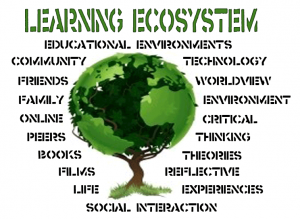How To Learning and Teaching Ecosystem Behaviour ?

Lately, the term ecosystem has taken the education system by the storm. The term refers to a new way of managing teaching and learning. The ecosystem includes everyone – parent, schools, tutors and even technology. To better understand the concept let’s compare it with a known entity. Earlier education was hierarchal, i.e., there was a top dog that taught the lower rung and that lower level in turn taught it to someone else. Simply put, a student learned from one point and one direction, and this was generally the teacher. Many Competitive exams coaching centre need to explain their students about ecosystem aa it forms part of their syllabus.
Importance Of Skills Training in Today’s Education Ecosystem
 Now education is somewhat akin to a network. The student learns from a lot of different people who play different roles in their lives. The teacher is not the sole avenue of knowledge. Parents, siblings, friends, elders, and peers all bring some value to the child. This is known as an ecosystem education. It also includes learning from mixed modes, i.e., from books, from computers, from activities to even mobiles and tablets. Instead of one size fits all learning methodology that was used for decades, learning is now tailor-made to the student.
Now education is somewhat akin to a network. The student learns from a lot of different people who play different roles in their lives. The teacher is not the sole avenue of knowledge. Parents, siblings, friends, elders, and peers all bring some value to the child. This is known as an ecosystem education. It also includes learning from mixed modes, i.e., from books, from computers, from activities to even mobiles and tablets. Instead of one size fits all learning methodology that was used for decades, learning is now tailor-made to the student.
Explore More About : Adjusting To The Learning Ecosystem
Traditional Ecological Knowledge in Education
This custom approach begins right at the kindergarten level, the most crucial stage of a child’s life as per www.education.vic.gov.au/childhood/parents/kindergarten/Pages/about.aspx. Ecosystem learning continues even after graduating from school and entering exam coaching centres. This breakdown of the traditional learning method and acceptance of an ecosystem frame has made it easier for students. It is because the concept is more adaptive to the learner. The topics are aligned to the context while being taught and the conditions of learning are more conducive to the child.
An example would be learning about an apple – its colour, shape, and taste – while holding the fruit in hand in a farmer’s garden or market. The student comprehends more, learns faster and retains a lot when all the senses are involved. This is the primary benefit of an adaptive ecosystem. It does not resist disruptions like say using technology to learn about the history of the world. It leverages every opportunity that arises from any resource or relationship. In an ecosystem the learning doesn’t stop with teachers, it continues at home with parents and when playing with the  peer group.
peer group.
Do They Really Need Coaching Institutes For Ecosystem Learning ?
Ecosystem learning is still at the budding stage. Novel amalgamations of different players are being tested to create a model that best fits. Does a child learn more when parents and school teachers are involved or do they learn better when coaching centres and school combine their force? These are grounds that are being tested to create sustainable value for the student. Even the curriculum that is planned for children is seeing a change. Teachers, experts and other agents of learning, like a librarian, come together to create content that is best.
Blended learning is the need of the hour. Competency-based evaluations are proving more fruitful than conventional assessments. Schools, staff, and faculties are opening to the idea of experimentation more and more every day. It has made ecosystem education even more popular.





